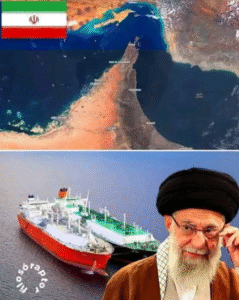🚨🇮🇷 BREAKING: Iranian Parliament Approves Closure of the Strait of Hormuz — What It Means
A Dramatic Vote Amid Escalating Tensions
In a striking development, Iran’s parliament has signaled its support for closing the Strait of Hormuz, a vital waterway that carries nearly 20% of global oil and gas shipments. While the decision is not yet final, it marks a significant escalation in the standoff following recent U.S. and Israeli airstrikes on Iran’s nuclear facilities Reuters+3Facebook+3Instagram+3.
The parliamentary vote is largely symbolic: actual implementation rests with Iran’s Supreme National Security Council, as confirmed by state media. That top body holds the authority to authorize—and potentially veto—the closure decision Reuters+1.
Why the Strait Matters
The Strait of Hormuz lies between Oman and Iran and is one of the world’s most critical chokepoints for energy transportation. Approximately 21 million barrels of oil per day, or about one out of every five barrels traded globally, pass through it Reuters+1. Closing it—even temporarily—would likely send energy prices soaring, trigger global economic shockwaves, and heighten geopolitical conflict risk.
The Catalyst: Airstrikes on Nuclear Facilities
Iran’s escalation followed Operation Midnight Hammer, in which U.S. and Israeli forces carried out large-scale airstrikes on Iranian nuclear sites—including the Fordow and Natanz enrichment facilities. These attacks prompted deep anger in Tehran and provoked the parliamentary move on Hormuz closure Newsweek+2Reuters+2.
Iranian lawmakers cited the threat to national sovereignty and damage to critical infrastructure as key reasons for their vote. The strike reportedly involved advanced ordnance such as Massive Ordnance Penetrator (MOP) bombs and submarine-launched Tomahawk missiles Newsweek+1.
Iran’s Counterbalance to the West
By backing the closure plan, Iran’s parliament signals a hardening stance toward the West and nuclear oversight bodies. At the same time, Tehran is also considering moves to suspend cooperation with the International Atomic Energy Agency (IAEA). Parliament has passed a bill to suspend inspections, camera installations, and reporting obligations—though it still requires approval by the Supreme National Security Council Reuters+1.
Officials, including Parliament Speaker Mohammad Baqer Qalibaf, argued that the IAEA had failed to condemn the strikes on Iran’s nuclear facilities and had compromised its credibility. Iran continues to deny pursuing nuclear weapons but vowed to expand its civilian nuclear program more rapidly Reuters+1.
Global Reaction: A Delicate Balance
The potential closure has alarmed global leaders and energy markets. U.S. Secretary of State Marco Rubio strongly urged China to intervene and dissuade Iran, warning that blocking Hormuz would be “economic suicide” for Tehran and could prompt a forceful international response Reuters.
China, heavily reliant on Gulf oil, responded by urging all parties to prioritize stability and avoid escalation. Other major economies similarly expressed concern over the possibility of a shutdown of this critical route Reuters+1.
Strategic Implications
Should the closure move forward, it could greatly disrupt international trade, raise energy prices, and destabilize regional security. Historically, Iran has used the Hormuz threat during past crises—such as the Iran-Iraq War—but this level of parliamentary support marks a new escalation Newsweek+1.
Analysts warn that even temporarily halting oil transit could spike shipping insurance rates, hinder global supply chains, and provoke retaliatory measures. Military observers note the narrow channels and Iran’s ability to lay mines or harass maritime traffic as methods of blockade without full-scale closure Newsweek+1.
Internal Politics: Hardliners Strengthen Grip
The vote illustrates growing influence of hardliners within Iran’s political system. Following the nuclear facility strikes, parliament is showing increasing willingness to challenge international norms and assert national sovereignty—often without the filtered approval of senior leadership bodies like the Guardian Council and Supreme Leader The Economic Times+1.
While Iran’s leadership has not yet confirmed final approval, the alignment of parliament and national security apparatus indicates a unified escalation posture. Iran also risks isolating itself further from Western diplomacy, potentially accelerating withdrawal from or reinterpretation of the Nuclear Non-Proliferation Treaty (NPT) framework Reuters+1.
A Tipping Point Approach
If the Supreme National Security Council sanctions closure, Iran may move incrementally—first deploying missile drills, then restrictions on shipping lanes, followed by physical barriers or mines. International responses may include naval deployments, economic sanctions, or diplomatic pressure coordinated with allies Reuters+1.
Some analysts believe the vote’s intent is more symbolic: a bargaining chip to pressure negotiations and reduce pressure from Europe’s “E3” (Britain, France, Germany) pushing for renewed nuclear talks. Others fear that it may signal Iran’s willingness to use maritime leverage as retaliation.
What Comes Next?
-
Final approval: Iran’s Supreme National Security Council must endorse any closure measures before they take effect.
-
Energy markets: Oil and gas futures remain volatile until the international community clarifies its response posture.
-
Diplomatic gridlock: Talks with Western powers and the IAEA remain stalled without guarantees or clarity from Tehran.
-
Regional escalation: Israel and Gulf states may respond with increased readiness or military posturing in the Persian Gulf.
Key Themes and Takeaways
| Theme | Importance |
|---|---|
| Escalation | The parliamentary motion marks a significant intensification of Iran’s confrontational posture following U.S. and Israeli strikes. |
| Maritime leverage | Iran’s ability to disrupt global oil flows through the Hormuz Strait gives it strategic bargaining power. |
| Domestic politics | Rising influence of hardliners may sideline moderate voices and reduce room for diplomatic compromise. |
| Global ripple effects | Closure of Hormuz would impact global markets, security, and energy policies—prompting international response. |
| Negotiation pause | Suspending cooperation with the IAEA complicates talks and increases risk of renewed sanctions or diplomatic penalties. |
Final Reflection
The Iranian parliament’s vote to back the closure of the Strait of Hormuz represents both symbolic defiance and tangible threat. While implementation remains uncertain, the message is clear: in the aftermath of foreign strikes on its sovereign land, Tehran is prepared to wield maritime leverage if its security is compromised. With global energy markets in suspense and diplomatic channels frayed, the coming days may determine whether this moment leads to de-escalation or spirals into further confrontation.


